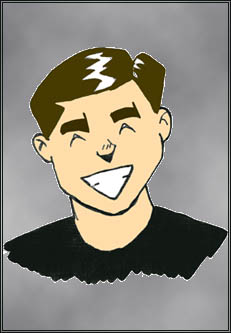

|
About
Resume Voice Video Blogs Contact Calendar Feeds |
|
|
I'm Reading (Subscribe)
Magazines, novels, articles, poetry, interviews or other textual (and sometimes illustrated) media that's currently caught the mind of Adam Creighton ...
Monday, July 23, 2007
Making Comics
I finished Scott McCloud's Making Comics: Storytelling Secrets of Comics, Manga and Graphic Novels, some time ago, and (as always) I'm impressed, inspired, and better equipped than before my read. So I'm finally getting around to plugging it here.This is the third in his "series" of books, following Understanding Comics and Reinventing Comics.
By way of background, I read Scott's books for a number of specific reasons.
I love comic books and sequential medium. I think they're a powerful, nascent medium, as old (arguably older) than film, but only now starting to touch on their potential and import. These books look at the history and technique behind sequential art, ways creators try to evoke a response in readers, and ways by and filters through which readers interpret the medium.
As a creative, these are amazing books in adding process and technique for everything from storytelling, to writing, to layout, to publishing, and a bunch of stuff in between. I've used the books for things like my own recent comic book, my voice and film acting, and software design and management.
I've also got a formal usability background (academic and via a Blue User-Centered Design Center). That training and and interest in how things work (or don't) is something I apply to everything from software and service design, to writing, to comic books, to ideas for inventions. These books add to all of that.
Finally (for now at least), I'm impressed with the cognitive study and psychology laid bare in these books. In college, one of my favorite, brain-bending courses was "The Evolutionary Theory of Cognitive Development" -- these books fit in nicely (and more accessibly) into the concepts and theories introduced to me in that course.
All three books use actual comic / sequential art panels to get their message across. No long prose, and examples are inline (the whole freakin' book is an inline example), which makes for an accessible, effective how-to guide that has few contemporaries.
Before reading Making Comics, I'd read reviews and heard comments from industry acquaintances who thought the book was the "weakest" of the three.
Everyone's entitled to their opinions, but these folks' opinions are wrong. ;-)
The three books should be looked at as a funnel. Understanding Comics is a survey book for the history, tropes, techniques, and styles inherent in comic books, creative pursuits, psychology, and usability. Reinventing Comics builds on those concepts, and starts to look at (given the deeper subjects) how you can get away from "because this is the way it's done" to doing something truly innovative with sequential art.
Making Comics builds on and focuses those things raised in Reinventing Comics to a nuts-and-bolts application of creating traditional and innovative art. This latest book in particular helped me create innovative story, interesting panel layouts and transitions, and deceptively simple parody in my own recent comic book. I say this not to toot my own horn (much, but do go buy my comic book), but to provide a case-study(ish) of how the books made the creative process fairly painless, with decent output.
Scott is bolstering the book with a "Chapter 5 1/2" already online, with promises (in-text and on the book's Website) of more content "coming soon".
The book is a great read without the previous two, but reading (or, *ahem*, re-reading) the two books prior really explodes the potential of the last book, and served as a creative and hard-work catalyst for my own work.
A good read all around, and I heartily recommend it.
I'll hopefully see Scott at Comic-Con this week, and hope to say "thank you" for this and the previous two books.
Labels: comic books, How-To, Scott McCloud



